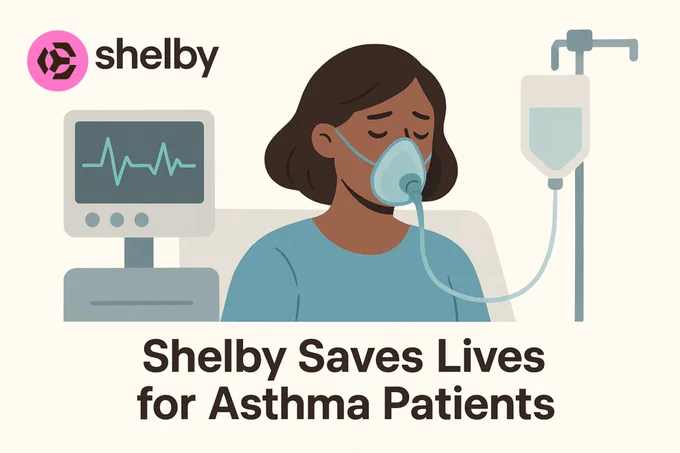😷
Asthma (A Hidden Threat)
Asthma affects 8.7% of U.S. adults-25 million people, and claims 450,000 lives globally each year. This chronic lung condition causes wheezing, breathlessness, and life-threatening attacks, often triggered by pollution, allergens, or stress. Yet, many suffer in silence due to lack of education, access to care, or timely intervention. @shelbyserves, powered by the @Aptos, can transform asthma care through content and beyond, saving lives one breath at a time. [(cdc.gov/asthma) (who.int)] (World Health Organization)
▫️The Numbers Behind the Struggle
- Prevalence: 25 million U.S. adults and 4.8 million children have asthma; 12% of Black adults are affected vs. 7% of White adults.
- Mortality: Asthma causes 3,500 U.S. deaths annually; globally, 450,000 lives are lost.
- Attacks: 1.8 million ER visits yearly in the U.S., with 50% of patients experiencing at least one attack annually.
- Disparities: Urban and minority communities face 20% higher asthma rates due to poor air quality and limited healthcare access.
- Economic Cost: Asthma costs the U.S. $82 billion annually, with patients spending $3,000 more per year than non-asthmatics.
Source: aafa.org (Asthma and Allergy Foundation of America)
▫️A Real-Life Story
Meet Amina, a 30-year-old teacher in an urban neighborhood. During a class, she suddenly struggles to breathe, her chest tight, wheezing loudly. Her inhaler is at home, and the nearest hospital is 20 minutes away. Without quick access to her medical history or trigger management tips, Amina’s asthma attack escalates, landing her in the ER. This is the reality for 1.8 million Americans each year, where delays and lack of resources turn manageable moments into emergencies.
▫️Why Asthma Is Hard to Manage
- Trigger Awareness: 60% of patients don’t know their specific triggers (e.g., pollen, pollution), delaying prevention.
- Access Gaps: 25% of rural and urban patients lack nearby specialists; inhalers cost $50–$300 without insurance.
- Education Shortfalls: Only 40% of asthma patients receive proper training on inhaler use, increasing attack risks.
- Data Delays: Missing medical records during emergencies (e.g., allergies, prior treatments) slow critical care by 10–15 minutes.
▫️How Shelby Saves Lives
Shelby’s decentralized platform on Aptos’ fast, secure blockchain tackles asthma’s challenges with a multi-pronged approach:
1. Life-Saving Content Delivery
- Doctors, nurses, and educators can share trusted content on Shelby - videos on inhaler techniques, trigger avoidance (e.g., “5 Ways to Reduce Pollen Exposure”), or stress management for asthma control.
- Unlike centralized platforms, creators bypass algorithms, ensuring Amina accesses reliable guides in her urban community, where asthma rates are 20% higher.
- Aptos’ high-throughput blockchain delivers content instantly, critical when 50% of patients face annual attacks.
2. Real-Time Medical Data Access
- Shelby enables secure, instant access to medical records. In Amina’s case, paramedics could retrieve her allergies, medication history (e.g., albuterol use), and prior attacks in seconds, speeding up treatment and reducing ER visits (1.8 million annually).
- This cuts delays that worsen outcomes, especially in rural areas with 20% longer response times.
3. Community and Incentives
- Shelby’s read-incentivized model rewards users with tokens for engaging with asthma content, like watching “How to Use Your Inhaler Correctly.” Amina could earn tokens to offset inhaler costs ($50–$300), encouraging proactive learning.
- Peer-to-peer communities connect patients, letting Amina share trigger tips with others in high-risk urban areas, reducing isolation (reported by 30% of patients) and boosting Adherence...
Nov 8, 2025 · 10:59 PM UTC


